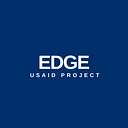ALBANIA AND KOSOVO FRUIT & VEGETABLE COMPANIES ADOPT FOOD STANDARDS AND INCREASE EXPORT PROSPECTS
The requirements from the European consumers and retailers and the fierce competition in the fruit and vegetables (F&V) market segment have incentivized farmers and companies in Albania and Kosovo to implement international food safety standards. In addition to the HACCP food safety system, foreign buyers are requiring ISO 22000 or BRC Global Standards. As the demand for organic products in EU markets has increased significantly in the last decade, there is a substantial export opportunity for farmers in Albania and Kosovo, if they adopt these international food safety standards.
With USAID Economic Development, Governance and Enterprise Growth project support, Creative Business Solutions (CBS) from Albania is implementing an activity for certification of F&V SMEs, producers and processors from Albania and Kosovo, assisting them to attain food safety standards and improving quality and safety along the value chain, increasing competitiveness and exports, while fostering regional partnership.
To date CBS has supported four farmers and SMEs and one producers’ group to successfully implemented Global G.A.P standard, one producer implemented Organic Standard according to EU regulation on organic production and labeling of organic products. At the storage and processing level, two SME has implemented HACCP self-control system, three SMEs implemented ISO 22000 on food safety management and one SME British retail Consortium (BRC) Global standard on food safety.
Through the Grant, the Fruit and Vegetables Exporters Association in Albania and the Association of Fruits and Vegetable Processors of Kosovo are collaborating closely making possible for their members to jointly sell to external markets filling product and seasonality gaps. CBS has also worked to establish a collaboration network of producers’ groups and export companies of fresh fruits and vegetables in both countries to fill the gaps of products supplied seasonally in the two countries.
Doni Fruits Ltd is the first Albanian F&V company that has successfully implemented the British Retail Consortium (BRC) food standard. Established in 2013, Doni has grown rapidly and has developed a large network of cooperating farmers from the nearby agriculture regions of Lushnje, Fier, Berat and other regions of Albania. “We actively invest in expanding our supplier base, and we have contract farming with over 1,300 local farmers,” points Mr. Rrapokushi, Quality Management System Manager at Doni. “The company has 80 full-time staff on regular basis, and the number of employees grows to over 120 in peak season, majority of which are women. Recently we invested in new packaging, cold storage and distribution facility of 11,470 m2, and now we have capacity of shipping 15 trucks a day,” continued Mr. Rrapokushi. Doni had already been certified with international food certificates, such as HACCP, Global Gap, ISSO 2021. With the latest BRC certification, they plan to further expand the export markets. “We are exporting fresh vegetables in 28 countries in the Western Balkans and the EU, and we are suppliers of large retailers such as Lidl, REWE and Metro. Our main exports are tomatoes, cucumbers, lettuce, cabbage, broccoli, cauliflower, beetroots, carrots, onions, etc.” said Alban Vinca, Export Director at Doni. “We have annual exports of 18,000 tons of fresh vegetables — our exports actually grew during the COVID-19 pandemic, and we experienced 10% annual increase,” closes Mr. Vinca.
Another company that implemented an international certification is Albania Piemonte — Al-PI Ltd, vegetables processors specialized in sun-dried tomatoes and tomato sauces. Al-Pi was established in 2014 by an Albanian entrepreneur who has previously worked in Italy’s Piemonte region, and has brought the know-how to Albania. They are the first producer and exporter of sun-dried tomatoes from Albania, and it became their signature product. “We export to Italian market and the demand for the sun-dried tomatoes is much higher than what we are currently producing, therefore we invested in enlarging the processing facility, and we are continually expanding our supplier network of contracted farming which is currently 120 farmers,” said Kujtim Skenderi, co-owner of Al-PI Ltd. They have joined forces with Jege Foods Ltd from Kosovo in order to accommodate the increasing demand by exchanging products with each other and planning joint investments in the future to expand production capacities. Both AL-PI and Jege Foods received support to obtain ISO 22000 certificate.
AgroBuli, a family business in Kosovo established in 2016 producing vegetables and seedlings is run by Mr. Bujar Bega and his wife Nita. Their annual production of 250,000 vegetable seedlings and more than 100 tons of vegetables is contracted with wholesalers and retailers. AgroBuli is cooperating with Doni Fruits, but is currently also exploring export markets. “We cultivate vegetable seedlings, tomatoes and green salad. This year we were certified with Global Gap with the support of the USAID project, and this has opened up export opportunities,” notes Mr. Bujar Beqa, co-owner of Agribuli. “During the certification process, we were trained on how to maintain hygiene in greenhouses, best harvesting methods, best packaging practices, proper storing of fungicides, etc. This was especially important for our employees.”
With these activities for expanding of production facilities, enlarging the base of contracted farmers, establishing regional partnerships, and certifying the production, F&V companies are better positioned to harness new exports opportunities in the EU markets; both in terms of volumes of orders and quality of produce. Upon the completion of the certification of 18 leading companies, the overall capacity of the F&V sector to meet the EU consumer’s demands will be significantly increased.
